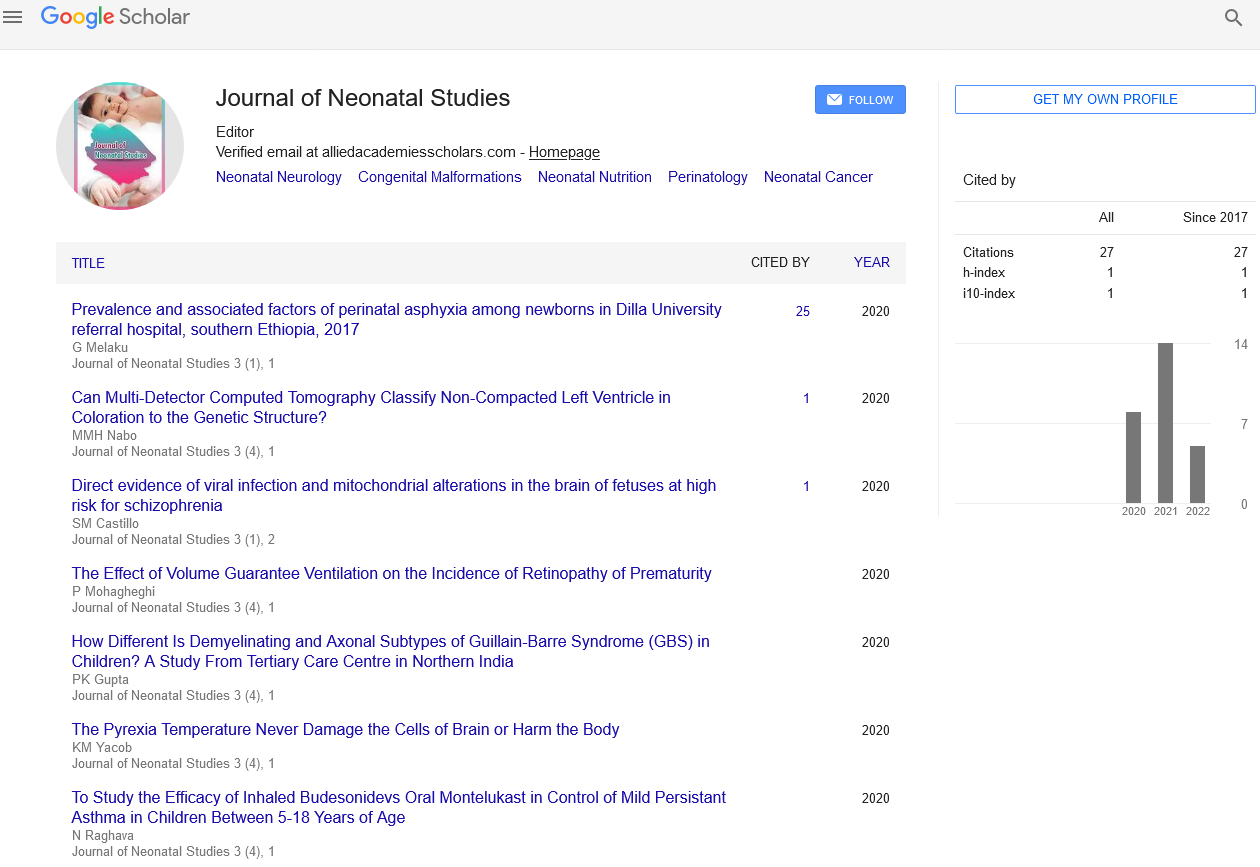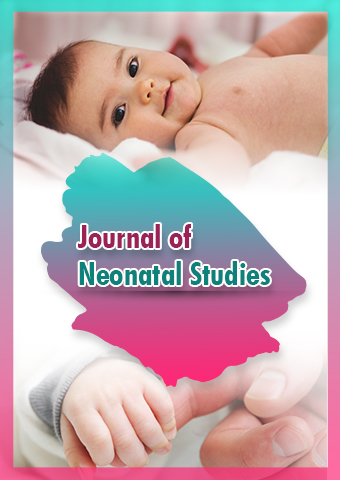Short Article - Journal of Neonatal Studies (2020) Volume 3, Issue 2
A Contribution Of Methylenetetrahydrofolate Reductase (MTHFR) Gene Polymorphisms In Children With Attention Deficit Hyperactivity Disorder
Khaled Ismail AbdElShakoor
Ain Shams University, Egypt
Abstract
Background: Attention Deficit Hyper-Activity Disorder (ADHD) is a neuro-behavioral, complex disorder influenced by many genes. The MTHFR gene C677T and A1298C polymorphisms affect both nucleotide synthesis and DNA methylation. This study aimed to assess the relationship between Methylenetetrahydrofolate Reductase (MTHFR) gene polymorphisms and ADHD in a sample of Egyptian children. Methods: MTHFR gene polymorphisms were evaluated in 60 participants, 30 ADHD patients and 30 controls of healthy children with normal developmental and psychiatric evaluation with comparable age and sex. The patients were recruited from Psychiatric clinic, Faculty of Postgraduate Studies for Childhood-Ain Shams University, Cairo, Egypt during the period from January to August 2015 with age ranged from 6 to 12years. MTHFR C677T and A1298C alleles distribution was investigated via polymerase chain reaction (PCR) and reverse hybridization. Results: The recorded genetic results showed heterozygous advantage (Heterosis) regarding studied C677T allele genotype with statistically significant association reported in controls compared to ADHD cases (p=0.0159). Genotype distributions of A1298C allele showed statistically high significant association with ADHD cases compared to controls (p=0.0002). A significant association was found between males of ADHD cases and hetero- homozygous A1298C allele compared to controls (p=0.0079). Meanwhile, ADHD females showed statistically significant higher distribution of the hetero- homozygous genotypes compared to controls (p=0.0072). Conclusions: There was an evident association between ADHD phenotype and MTHFR A1298C gene polymorphism, and there was a heterozygous advantage (Heterosis) regarding C677T allele genotype and ADHD cases leading to absence of association between MTHFR C677T gene polymorphism and ADHD.
Keywords: MTHFR gene, A1298C allele, C677T allele, Genotype, Phenotype, Attention Deficit Hyperactivity Disorder (ADHD).
Introduction: Attention Deficit Hyperactivity Disorder (ADHD) is a psychiatric disorder of the neurodevelopmental type [1]. Defined by symptoms of developmentally inappropriate inattention, hyperactivity, or acting impulsively that are not appropriate for a person's age [2]. The symptoms must begin by the age of six to twelve years and continue to be present for more than six months [3]. A recent metaanalysis estimated the world-wide prevalence of ADHD to be about 7.2% and diagnosed in about 2 to 16% in school aged children [4]. It is a chronic condition that affects millions of children and often persists into adulthood; the social and economic costs of childhood ADHD are considerable [5].
Family twin and adoption studies suggested that 70% heritability rate for the disorder [6]. Evidence from animal and human studies implicated degranulation of the frontostriatal and fronto-cerebellar catecholaminergic circuits in children and adolescents with ADHD [7]. Hypoactivity of the dorsolateral prefrontal cortex, caudate, and thalamus was also demonstrated in ADHD probands [8]. Although the exact cause is unknown, heredity prenatal or perinatal factors, exposure to toxins and heavy metals, socio-psychological stress, diet, structural and functional abnormalities of the brain contributed to ADHD etiology [9].
Maternal folate deficiency during gestation was reported to affect childhood hyperactivity [10]. Folate plays an important role in homocysteine and S-Adenosyl- Methionine (SAM) biosynthesis, low folate level affects neural stem cell proliferation, decreases apoptosis, and alters DNA biosynthesis [11]. Deficiency of various maternal nutrients including folate has been associated with neurodevelopmental disorder like ADHD and autism [10]. Abnormal folate transport into the fetal central nervous system has been related to cerebral folate deficiency associated with developmental delay, cognitive impairment and reduced memory function, while higher plasma folate level showed a correlation with better cognitive performance [12-14].
Methylenetetrahydrofolate Reductase (MTHFR) is important for folate chemical reactions. MTHFR gene is located at the end of the short arm of the chromosome 1p 36.3 [15]. The enzyme methylenetetrahydrofolate Reductase (MTHFR) helps converting folate in folate metabolic cycle to other metabolites used for cellular processes including methylation of the gene promoter enhancers, proteins, RNA, DNA, amino acids and phospholipids synthesis. MTHFR enzyme converts 5, 10- methylentetrahydrofolate to 5-methyltetrahydrofolate, which is the predominant circulating form of folate, and this reaction is required for a multistep process which converts homocysteine to other amino acid methionine. Methyl tetrahydrofolate donates its methyl group to convert homocysteine into methionine in the presence of methionine synthetase and vitamin B12 during the generation of S-adenosyl methionine, a major source of methyl group in the brain [9]. MTHFR polymorphisms C677T and A1298C affect nucleotide synthesis and DNA methylation [16]. Several studies link folate/homocysteine levels with cognitive functions, as patients with folate deficiencies in the CNS exhibited cognitive deficits [12].
Decreased MTHFR activity leads to increased plasma homocysteine and decreased methionine concentration. Methionine can be used to produce SAM, Homocysteine and S-Adenosyl-Homocysteine (SAH). The SAM regulates methylation of DNA, RNA, protein, and phospholipids. In the brain, SAM-dependent methylations generate neurotransmitters (Catecholamines and indoleamines), phospholipids, and myelin [17]. MTHFR gene is a key regulator for folate versus homocysteine levels [18]. The MTHFR C677T and A1298C polymorphisms affect both nucleotide synthesis and DNA methylation [16]. The MTHFR C677T polymorphism is associated with reduced folate bioavailability and folate metabolites that "mimics" low dietary folate intake [19]. The MTHFR A1298C polymorphism is less severe, and homozygous carries of this allele have a moderate 30-40% reduction of the enzyme activity, yet its function remains controversial [20]. MTHFR polymorphisms A1298C allele, especially in its homozygous expression, can result in a disturbance in the biochemical tetra-hydro biopterin (BH4) and methylation pathways. BH4 is a key factor in the synthesis of serotonin, dopamine, epinephrine, and norepinephrine. Optimal functioning of these neurotransmitters is integrally involved in behavioral symptoms that define ADHD [21].
Scanty studies investigated the association between ADHD and MTHFR gene polymorphism. Accordingly, the aim of this study was to determine the relationship between common MTHFR gene mutations (C677T and A1298C) and ADHD as a phenotype in a sample of Egyptian children.
Conclusion: It can be concluded that there was an evident association between ADHD phenotype and MTHFR A1298C gene polymorphism, and there was a heterozygous advantage (Heterosis) regarding C677T allele genotype and ADHD cases leading to absence of association between MTHFR C677T gene polymorphism and ADHD. There was a positive correlation between ADHD and family history of medical and psychiatric illness. Bladder control mean age was significantly higher among studied ADHD cases than controls, speech disorders, associated aggressive behavior, and poor academic performance were significantly higher among ADHD compared to controls.

